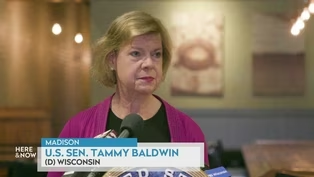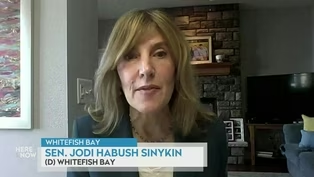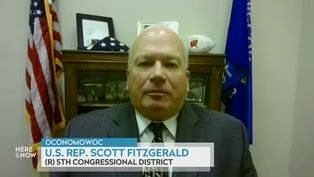Here and Now
Diana Maas on Funding for Energy Assistance in Wisconsin
Clip: Season 2400 Episode 2419 | 5m 16sVideo has Closed Captions
Diana Maas on the Wisconsin Home Energy Assistance Program's federal funds being delayed.
Wisconsin Department of Administration Assistant Deputy Secretary Diana Maas discusses the status of the Wisconsin Home Energy Assistance Program with federal funding delayed as utility costs rise.
Problems playing video? | Closed Captioning Feedback
Problems playing video? | Closed Captioning Feedback
Here and Now is a local public television program presented by PBS Wisconsin
Here and Now
Diana Maas on Funding for Energy Assistance in Wisconsin
Clip: Season 2400 Episode 2419 | 5m 16sVideo has Closed Captions
Wisconsin Department of Administration Assistant Deputy Secretary Diana Maas discusses the status of the Wisconsin Home Energy Assistance Program with federal funding delayed as utility costs rise.
Problems playing video? | Closed Captioning Feedback
How to Watch Here and Now
Here and Now is available to stream on pbs.org and the free PBS App, available on iPhone, Apple TV, Android TV, Android smartphones, Amazon Fire TV, Amazon Fire Tablet, Roku, Samsung Smart TV, and Vizio.
Providing Support for PBS.org
Learn Moreabout PBS online sponsorshiplooks like then.
Congressman Scott much.
>> Thank you so much.
Good to be with you.
>> As the weather turns colder, we all push up the thermostat to heat our homes, families who need financial help to pay their utility bills may have to wait because of the government shutdown, despite it being over last year, nearly 190,000 Wisconsin households received nearly $137 million in assistance, an average of about $315 per household.
The Wisconsin Energy Assistance Program receives both state and federal funding.
Now, the state funding is secure, but the federal funds aren't expected to be released until December or January.
Here with more information on this, we are joined by Assistant Deputy Secretary Diana moss from the Wisconsin Department of Administration.
And thanks very much for being here.
>> Yeah, thanks for having me.
ended the shutdown fully fund the low income Home energy assistance program?
>> Not yet.
It reopened the government, which is great.
And now, as we understand it, our LIHEAP folks in the federal government can get to work in trying to calculate what the allocations will be to each state.
And that's what we expect is still going to take some time.
>> And so how much delayed is this from a usual year when states would get that allocation.
>> Yeah.
At this point you know I would say we're predicting a month or more delayed from a typical year.
It's typical that we don't yet have our dollars at the beginning of the heating season, but we would normally know our award allocation and we don't yet know that.
And so part of that is because of the federal government shutdown.
But now that the government's open again, we expect they're going to take a few weeks to work that out.
>> And how will it affect the people who are trying to apply for that kind of assistance?
Will that also be delayed to them?
>> So they absolutely should apply now.
They should continue applying.
Applications are open and our providers are taking those applications and available to assist in that way so they can find out if they're eligible or ineligible.
And that helps us so that once we receive the dollars, we're able to administer those benefits.
But the good news is folks should continue to apply throughout the season because if they're eligible today, but a circumstance changes, we will continue to recalculate that eligibility throughout the season.
based on income I trust.
>> That's right.
>> So does Governor Evers emergency order this week relating to housing or an energy crisis relate to this?
supplemental support to help those folks in need.
We know that these assistance programs support and serve the same communities that lie.
He continues to serve in the state.
>> So if President Trump, I understand that President Trump laid off the entire staff that administers this LIHEAP, this federal assistance Program for energy, how do you suspect that will affect payments to states?
>> Yeah, it may continue to factor into the delay.
It's you know, we can assume with less folks dedicated to working in this space, it might take longer to do the work.
So that's again, I think another factor that we anticipate will contribute to the delay.
>> So what happens.
We're back to shutdown talk now.
But what happens when the federal funding continuing resolution expires on January 30th?
Should the energy assistance funds already have been made available?
>> We anticipate.
So, yeah, if they were not you know, we're having a different conversation.
The good news is state law in Wisconsin prohibits disconnection April 15th.
So we know that folks will be safe in terms of their heat.
You know, utility companies won't be turning off their heat, but we will absolutely have to figure out the funding if we got to a future date where those dollars weren't yet administered.
>> How do people apply?
>> Yeah, they need to go to energy benefit.gov.
And that will give them all the information about where to find their local provider.
And they have options to apply by phone, in person, mail or right online.
>> So should people expect the same amount of assistance this year as they got last year?
>> We don't yet know because we don't yet have our dollar amount for program year 26.
We anticipate it will be very similar to last year, but we don't know until we get the award.
>> And the way it works is that if you apply for assistance, you are eligible and you are given assistance you that goes directly to your utility or to yourself?
the utility provider on their behalf.
And then we also the same program supports if their furnace goes out and it's a crisis situation, we would then support repair or replacement of that furnace.
But typically the most part of these benefits go directly to the utility company.
Baldwin Describes Focus on Health Care During the Shutdown
Video has Closed Captions
Clip: S2400 Ep2419 | 1m 14s | Tammy Baldwin explained why most Democrats held out during the 2025 government shutdown. (1m 14s)
Here & Now opening for November 14, 2025
Video has Closed Captions
Clip: S2400 Ep2419 | 1m 22s | The introduction to the November 14, 2025 episode of Here & Now. (1m 22s)
Sen. Jodi Habush Sinykin on a Bill to Regulate Data Centers
Video has Closed Captions
Clip: S2400 Ep2419 | 5m 15s | Jodi Habush Sinykin on a bill to regulate water and energy used by data centers. (5m 15s)
US Rep. Scott Fitzgerald on 2025 Government Shutdown Fallout
Video has Closed Captions
Clip: S2400 Ep2419 | 7m 5s | Scott Fitzgerald on the funding deal that ended the 2025 federal government shutdown. (7m 5s)
Why Catholic Sisters Sold Land Back to the Lac du Flambeau
Video has Closed Captions
Clip: S2400 Ep2419 | 6m 5s | A Catholic order sold a plot on Trout Lake to the Lac du Flambeau as a land back action. (6m 5s)
Providing Support for PBS.org
Learn Moreabout PBS online sponsorship
- News and Public Affairs

Top journalists deliver compelling original analysis of the hour's headlines.

- News and Public Affairs

FRONTLINE is investigative journalism that questions, explains and changes our world.












Support for PBS provided by:
Here and Now is a local public television program presented by PBS Wisconsin




